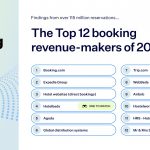In today’s day and age, most of us will have heard different variations of the terrible first date story…
NB: This is an article from GuestCentric
One such plot goes something like this: Two people, who have been chatting up a firestorm on their dating app of choice for some weeks, meet for the first time only to discover that their match is literally nowhere near what they represented themselves to be online. Maybe he told her he was 1.87m tall when in reality he is shorter than Tom Cruise. Or maybe she told him she was 35 years old, when in reality she is 42.
Subscribe to our weekly newsletter and stay up to date
Mixed signals occur when a person or brand is inconsistent in the messages they send people. They can simply be miscommunication or intentional. But no matter the reason, mixed signals definitely add a layer of stress and frustration to those on the receiving end – whether it’s our hypothetical couple above or online visitors browsing through a hotel website that poorly represents the property and the brand.
Is your hotel website giving mixed signals to guests? Does your property or group of hotels have amazing value to offer, but online visitors keep abandoning your website before booking a stay?
In this article, we share some examples of mixed signals you could potentially be sending to guests via your website, how to avoid these pitfalls, and what best practices you should implement instead to get more direct bookings.
The Hotel Website – Why First Impressions Matter!
According to Hubspot, the average time a person spends visiting a travel website is just 60 seconds. This means you have just one minute to make a strong first impression and encourage online visitors to book. You need to transmit the right messages that align with your brand and create as much demand as possible.
Your hotel website design speaks volumes about how much you care about your guests and the value you have to offer them. If you’re the proud owner of an upscale boutique hotel in downtown Lisbon, but publishing unflattering photos of your hotel bathroom or a plate of greasy food on your hotel website, you’re basically telling guests that your hotel could not care less about them and their experiences. In the end, the guests will abandon your website and you will lose out on their business.
Hospitality is the dreaming industry, and research shows that guests’ decision to book a hotel stay is driven strongly by emotion. Your hotel website is where guests get the first impression about your hotel. Therefore, it’s crucial that you make the guests dream with your property before they book and before their arrival. Guests want to feel special and welcomed to embrace emotion from the moment they land on your website, to “read” a story and to be reassured about the hotel quality that you have to offer.
Read rest of the article at GuestCentric
The post Is Your Hotel Website Giving Mixed Signals To Guests? appeared first on Revenue Hub.
































